Table of Contents[Hide][Show]
- Nutrivore Score for Portabella Mushrooms – 1483
- Portabella Mushroom Nutrition Facts
- Portabella Mushroom Nutrition Varies With Cooking and Processing
- Mushroom Nutrition Varies with Variety
Health Benefits of Portabella Mushroom Nutrients+−
- Portabella Mushrooms Provide 1.4 mg of Ergothioneine
- Portabella Mushrooms Provide 46% DV Vitamin B7 (Biotin)
- Portabella Mushrooms Provide 29% DV Selenium
- Portabella Mushrooms Provide 27% DV Copper
- Portabella Mushrooms Provide 24% DV Vitamin B3 (Niacin)
- Portabella Mushrooms Provide 20% DV Vitamin B5 (Pantothenic Acid)
- How Much Portabella Mushrooms Should We Eat Per Day?
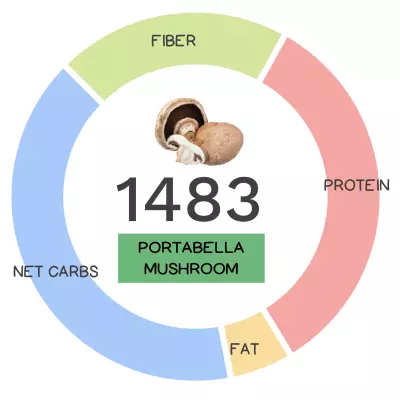
A popular vegetarian alternative to meat, portabella mushrooms work great as replacements for steak or burgers plus so much more. Known for their large size, these dark brown mushrooms with dark gills on the underside of their flat open caps, have a lower water content, which means a more concentrated and intense earthy, umami flavor, along with a dense, meaty texture, making these mushrooms the “belle” of the ball.
Mushrooms are one of the most unusual and beneficial foods on the planet – worldwide there are approximately 14,000 species!
As a group, mushrooms are one of the most unusual and beneficial foods on the planet, and include any spore-bearing, fruiting body of a fungus – worldwide there are approximately 14,000 species! Fungi are a unique class of organism (technically their own kingdom!) that play an important role in all ecosystems, especially as contributors to the decay and recycling of plant and animal matter. Mushrooms aren’t technically a vegetable, or plant for that matter, since they don’t require sunlight to produce energy, but they have been consumed by humans for thousands of years, dating back to earliest recorded history. Ancient Egyptians thought so highly of mushrooms that they were reserved for royalty, while commoners were prohibited from eating (or even touching!) them. Currently, over 200 edible mushroom species are cultivated, though only a small fraction of them are widely available; however, wild mushrooms can be foraged from nature and are even higher in nutrient density! Along with being remarkably versatile in the kitchen, mushrooms have a long history of use in cultures across the globe for their medicinal properties.
Mushrooms have been consumed by humans for thousands of years, dating back to earliest recorded history.
It may surprise you to learn that portabella mushrooms, along with white button and cremini mushrooms are in fact all the same variety of mushroom – Agaricus bisporus! The difference between the three is essentially age. Immature mushrooms, which are white, are known as common or white mushrooms, while mushrooms that are still immature and brown are known as cremini mushrooms. When full-grown and fully mature, they are known as portabella mushrooms, which is why cremini are often called ‘baby bellas’ – technically, that’s exactly what they are, a baby portabella mushroom! Collectively, they are one of the, if not the, most widely consumed mushrooms, grown in more than seventy countries around the world. In fact, in North America Agaricus bisporus has been the number one cultivated mushroom since the late 1800s.
The name ‘portabella’ came from a large marketing campaign in the 1980s designed to increase the approval of this mushroom, which was unpopular due to its size and dark color – rebranding it as a healthy meat alternative.
Portabella mushrooms have been around since ancient times. In nature, they typically grow individually on leaf litter near conifers, manure piles or in the grass. Sometimes referred to as ‘portobello’ or ‘portobella’, there is debate as to which is the correct spelling, though all are used interchangeably and came from a large marketing campaign in the 1980s designed to increase the approval of this mushroom, which was unpopular due to its large size and dark color (white foods like white rice and bread were considered more attractive to consumers). Re-branded as a healthy meat alternative and given a new name, the popularity of this once undesirable mushroom greatly improved and to this day it remains part of the in-crowd!
Up Your Nutrient Game Without Restricting Foods

How to Track Nutrient Density
Discover how nutrient dense your diet already is and how to fill in any nutrient gaps.
In this webinar, Dr. Sarah will give you a new perspective on food choices via the Nutrivore Score, and teach you how to calculate your daily Nutrivore Score, intuitively create balanced meals with the Nutrivore Meal Map, and set achievable serving targets for foundational food families.
Buy now for instant digital access.
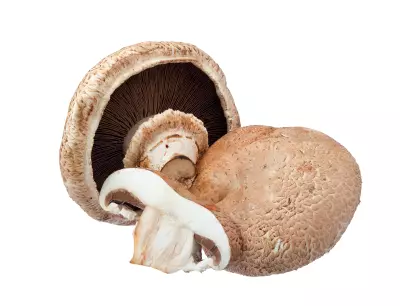
Nutrivore Score for Portabella Mushrooms – 1483
Portabella mushrooms have a Nutrivore Score of 1483, making them a super nutrient-dense food! Plus, they are a low-carb and low-calorie-density food; amazingly the calorie count of portabella mushrooms is just 19 calories per cup!
Per serving, portabella mushrooms are a best source (>50% daily value) of ergothioneine; and an excellent source (20-50% daily value) of copper, selenium, vitamin B3 (niacin), vitamin B5 (pantothenic acid), and vitamin B7 (biotin).
Ditch Diets. Embrace Nutrients. Start with These 5 Free Guides.
Sign up for the free weekly Nutrivore Newsletter and get 5 high-value downloads—delivered straight to your inbox—that make healthy eating simple and sustainable.
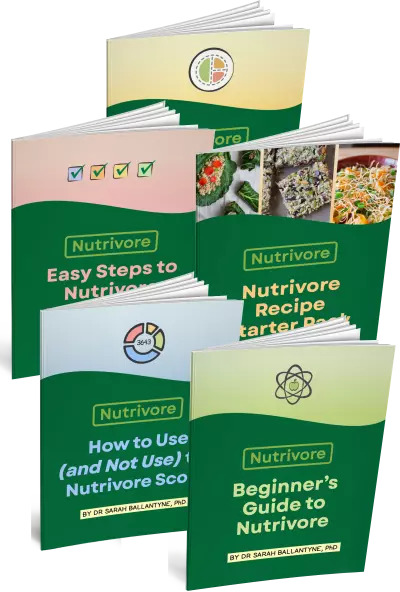
Portabella Mushroom Nutrition Facts
One serving of portabella mushrooms is standardized to 1 cup, diced or about 86 grams (3 ounces). When you cook portabella mushrooms, they reduce in volume: 1 cup of raw portabella mushrooms is roughly equivalent to a little less than 3/4 cup grilled portabella mushrooms.
Portabella Mushroom Nutrition Facts Per Serving
| Portabella mushroom, raw | Nutrivore Score: 1483 | Nutrient Density: Super! |
|---|---|---|
| Serving Size: 1 cup, diced (86 grams) | Protein: 1.8 grams | Net Carbohydrates: 2.2 grams |
| Calories: 19 | Total Fat: 0.3 grams | Dietary Fiber: 1.1 grams |
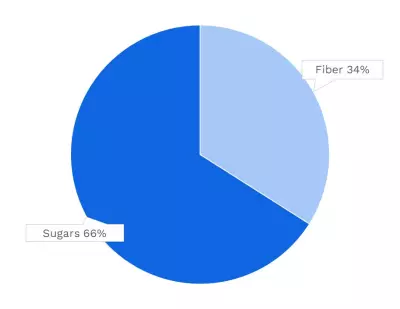
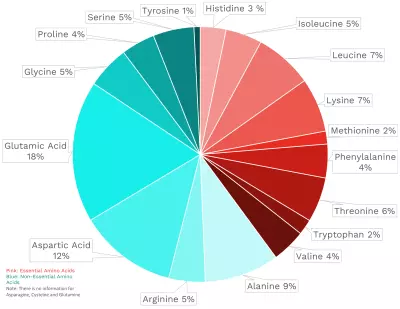
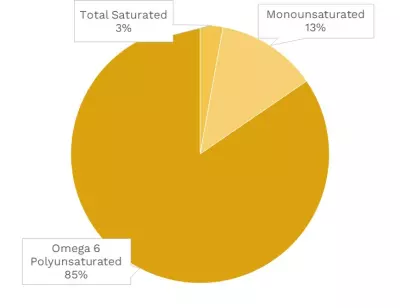
| VITAMINS | ||
|---|---|---|
| Vitamin A | 0.0 μg RAE | 0% DV |
| Vitamin B1 (Thiamin) | 50.7 μg | 4% DV |
| Vitamin B2 (Riboflavin) | 111.8 μg | 9% DV |
| Vitamin B3 (Niacin) | 3.9 mg | 24% DV |
| Vitamin B5 (Pantothenic Acid) | 1.0 mg | 20% DV |
| Vitamin B6 (Pyridoxine) | 127.3 μg | 7% DV |
| Vitamin B7 (Biotin) | 13.8 μg | 46% DV |
| Vitamin B9 (Folate) | 24.1 μg | 6% DV |
| Vitamin B12 (Cobalamin) | 0.0 μg | 2% DV |
| Vitamin C | 0.0 mg | 0% DV |
| Vitamin D (D2 + D3) | 0.3 μg | 1% DV |
| Vitamin E | 0.0 mg | 0% DV |
| Vitamin K | 1.5 μg | 1% DV |
| Choline | 18.2 mg | 3% DV |
| Myo-Inositol | 7.7 mg | ~ |
| CoQ10 | 0.0 mg | ~ |
| FUNCTIONAL FATS | ||
|---|---|---|
| MUFA | 0.0 g | 0% DV |
| ALA | 0.0 mg | 0% DV |
| EPA + DHA | ~ | ~ |
| CLA | 0.0 mg | ~ |
| Linoleic Acid | 0.1 g | 1% DV |
| MCT’s | ~ | ~ |
| MINERALS | ||
|---|---|---|
| Calcium | 2.6 mg | 0% DV |
| Copper | 246.0 μg | 27% DV |
| Iodine | ~ | ~ |
| Iron | 0.3 mg | 1% DV |
| Magnesium | ~ | ~ |
| Manganese | 59.3 μg | 3% DV |
| Phosphorus | 92.9 mg | 7% DV |
| Potassium | 313.0 mg | 7% DV |
| Selenium | 16.0 μg | 29% DV |
| Sodium | 7.7 mg | 0% DV |
| Zinc | 0.5 mg | 4% DV |
| PHYTONUTRIENTS | ||
|---|---|---|
| Carotenoids | 0.0 μg | ~ |
| Polyphenols | 64.1 mg | ~ |
| Phytosterols | 1.7 mg | ~ |
| Glucosinolates | ~ | ~ |
| Thiosulfinates | ~ | ~ |
| Betalains | ~ | ~ |
| AMINO ACIDS & PEPTIDES | ||
|---|---|---|
| Taurine | ~ | ~ |
| Ergothioneine | 1.4 mg | ~ |
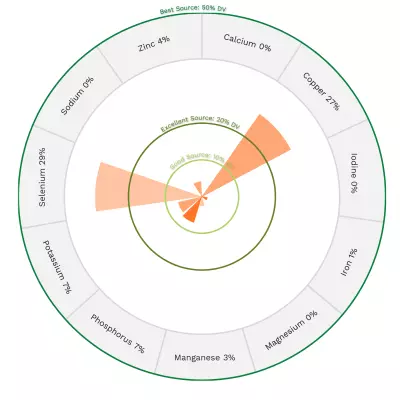
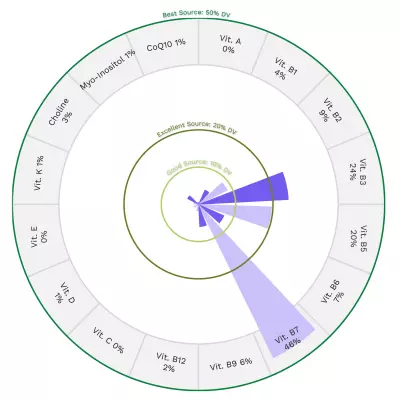
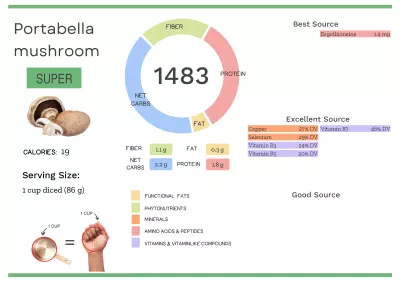

The Best Mushroom Extracts
- Wild-harvested, organic and sustainably-sourced mushroom extracts
- No starch, grain, fillers or mycelium
- Gluten-free, non-GMO and Vegan
- Verified for quality at accredited 3rd party labs
- Save 25% off, no code required
Portabella Mushroom Nutrition Varies With Cooking and Processing
The Nutrivore Score of portabella mushrooms varies depending on the method of preparation and processing.
| NUTRIVORE SCORE | |
|---|---|
| Portabella mushroom, exposed to ultraviolet light, raw | 15211 |
| Portabella mushroom, grilled | 1506 |
| Portabella mushroom, raw | 1494 |
Mushroom Nutrition Varies with Variety
There are many varieties of mushrooms, all with different nutrient profiles, which means their Nutrivore Scores vary too! Overall, mushrooms are powerhouses of nutrition, containing an extremely impressive amount of essential vitamins and minerals per calorie!
| NUTRIVORE SCORE | |
|---|---|
| Chanterelle mushrooms, raw | 1555 |
| Cremini mushrooms, raw | 2279 |
| Enoki mushrooms, raw | 4434 |
| Maitake mushrooms, raw | 3551 |
| Morel mushrooms, raw | 22711 |
| Oyster mushrooms, raw | 2550 |
| Portabella mushrooms, raw | 1483 |
| Shiitake mushrooms, raw | 4343 |
| White button mushrooms, raw | 1872 |
If you give a shiitake about mushrooms, maybe your friends will too!
Health Benefits of Portabella Mushroom Nutrients
Let’s take a closer look at all of the best and excellent source of nutrients found in a 1-cup serving of portabella mushrooms and see how they benefit our health.
Portabella Mushrooms Provide 1.4 mg of Ergothioneine
Portabella mushrooms are an amazing source of ergothioneine, providing 1.4 mg of ergothioneine per 1-cup serving!
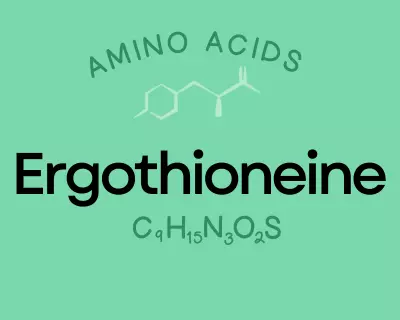
Ergothioneine is a non-proteinogenic amino acid with powerful antioxidant and anti-inflammatory properties shown to mitigate diseases associated with aging, including cardiovascular disease, cancer, liver disease, cataracts, and Alzheimer’s disease. It has been shown to enhance memory, reduce risk of depression, reduce neuroinflammation, and improve sleep. There’s evidence for a role in fetal development, female fertility, and it reduces risk of preeclampsia. Ergothioneine has even been called the “longevity vitamin” since studies show that it reduces all-cause mortality and is associated with longer lifespan. Learn more here.
Portabella Mushrooms Provide 46% DV Vitamin B7 (Biotin)
Portabella mushrooms are an excellent source of vitamin B7 (biotin), providing 46% of the daily value per 1-cup serving!
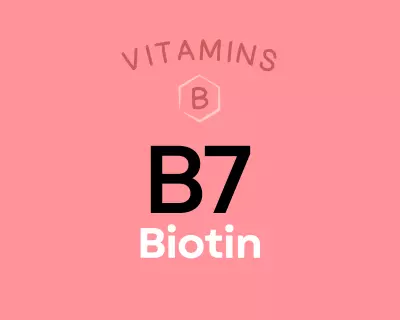
Biotin is a water-soluble B vitamin, also known as vitamin B7. Like other B vitamins, it plays an important role in energy metabolism (serving as a coenzyme for five carboxylase enzymes), neurotransmitter production, cellular function, and the function of various organs. Getting enough biotin can help support healthy nail and hair growth. It’s also particularly important during pregnancy, with low intakes increasing the risk of premature delivery and birth defects. There’s even some evidence biotin can benefit diabetics and reduce functional disabilities in people with multiple sclerosis. Learn more about biotin here.
Portabella Mushrooms Provide 29% DV Selenium
These mushrooms are also an excellent source of selenium, providing 29% of the daily value per 1-cup serving!

Selenium is a trace mineral needed by all mammals to sustain life. It serves as a component of the non-proteinogenic amino acids selenocysteine and selenomethionine, and also helps form over two dozen selenoproteins involved in reproduction, thyroid hormone metabolism, antioxidant defense, DNA synthesis, and immunity. Observational research suggests selenium could play a protective role against cancer, heart disease, asthma, and inflammatory bowel disease, although human trials have generally been lacking or contradictory. There’s also evidence that selenium can play a preventative role in asthma and inflammatory bowel disease, while also reducing mortality in patients with sepsis. Learn more about selenium here.
Portabella Mushrooms Provide 27% DV Copper
Portabella mushrooms are a great source of copper, providing 27% of the daily value per 1-cup serving!

Copper is a trace mineral that’s essential for all living organisms. Copper serves as a component of numerous enzymes and proteins in the body, giving it diverse roles in the growth, development, and maintenance of various organs (including the heart and brain), bone, and connective tissue. Copper is also involved in glucose and cholesterol metabolism, helps regulate gene expression, can scavenge free radicals, and is needed for the production of red blood cells. Learn more about copper here.
Portabella Mushrooms Provide 24% DV Vitamin B3 (Niacin)
Portabella mushrooms are also rich in vitamin B3 (niacin), providing 24% of the daily value per 1-cup serving!
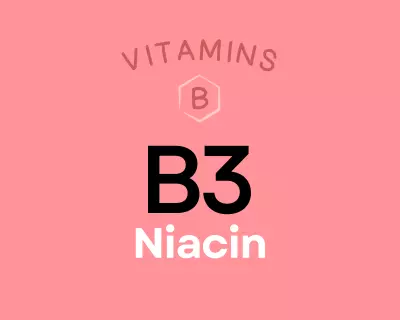
Niacin is a water-soluble B complex vitamin (vitamin B3) that’s needed to produce two very important coenzymes: nicotinamide adenine dinucleotide (NAD) and nicotinamide adenine dinucleotide phosphate (NADP). NAD and NADP are needed for over 400 enzymes involved in DNA repair, fatty acid synthesis, antioxidant systems, detoxification, and hormone synthesis, as well as the breakdown of fat, carbohydrate, protein, and alcohol. Niacin has therapeutic potential for cardiovascular disease and hyperlipidemia, and may also be protective against cancer and type 1 diabetes. Some research suggests it could benefit health outcomes for patients with HIV or schizophrenia as well. Learn more about niacin here.
Portabella Mushrooms Provide 20% DV Vitamin B5 (Pantothenic Acid)
In addition, portabella mushrooms are an excellent source of vitamin B5 (pantothenic acid), providing 20% of the daily value per 1-cup serving!

Pantothenic acid (or vitamin B5) is a water-soluble vitamin that serves as a cofactor for coenzyme A—which itself is critical for metabolizing many drugs and toxins, as well as forming derivatives (acetyl-CoA and succinyl-CoA) that participate in the synthesis of cholesterol, fatty acids, melatonin, the neurotransmitter acetylcholine, steroid hormones, heme, and vitamins A and D. Coenzyme A is also needed in the Krebs cycle, giving pantothenic acid a role in energy metabolism. Research suggests that a pantothenic acid derivative (pantethine) can help improve blood lipid profiles and reduce fatty streak formation and lipid deposition in the arteries, giving it a cardio-protective role. Additional research shows that panthothenic acid can accelerate wound healing, boost cellular production of the important antioxidant glutathione, and possibly help improve symptoms of rheumatoid arthritis. Learn more about vitamin B5 here.
Want to know the top 500 most nutrient-dense foods?
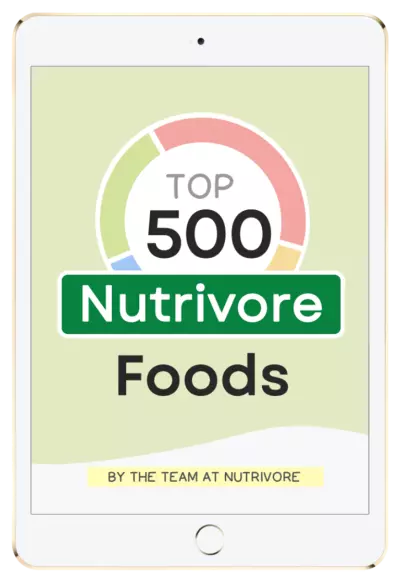
Top 500 Nutrivore Foods
The Top 500 Nutrivore Foods e-book is an amazing reference deck of the top 500 most nutrient-dense foods according to their Nutrivore Score. Think of it as the go-to resource for a super-nerd, to learn more and better understand which foods stand out, and why!
If you are looking for a quick-reference guide to help enhance your diet with nutrients, and dive into the details of your favorite foods, this book is your one-stop-shop!
Buy now for instant digital access.
How Much Portabella Mushrooms Should We Eat Per Day?
Whether you like them grilled, roasted, sauteed, stuffed, or in salads, soups, stews, or stir-fries, mushrooms are a phenomenal nutrient-dense addition to our plates.
Every serving of fresh, whole vegetables or fruit we eat daily reduces the risk of all-cause mortality by 5% to 8%, with the greatest risk reduction seen when we consume five or more servings per day. In fact, consuming 800 grams of vegetables and fruits daily reduces all-cause mortality by 31% compared to eating less than 40 grams daily. A 2017 meta-analysis showed that 2.24 million deaths from cardiovascular disease, 660,000 deaths from cancer, and 7.8 million deaths from all causes could be avoided globally each year if everyone consumed 800 grams of veggies and fruits every day.
Eating vegetables and fruit in abundance lowers risk of cancer, cardiovascular disease, type 2 diabetes, obesity, chronic kidney disease, osteoporosis and bone fragility fractures (including hip fracture), cognitive impairment and dementia (including Alzheimer’s disease), neurodegenerative diseases, asthma, allergies, chronic obstructive pulmonary disease, age-related macular degeneration, cataracts, glaucoma, depression, ulcerative colitis and Crohn’s disease, rheumatoid arthritis, inflammatory polyarthritis, non-alcoholic fatty liver disease, acne, seborrheic dermatitis, and lowers markers of inflammation. Learn more in Importance of Vegetables and Fruit.
Covering half of your plate with a variety of vegetables (and three quarters of your plate if your starchy food is a root vegetable or winter squash) at each meal is a simple way to easily achieve the goal of 5 or more servings of vegetables daily.
Studies show that edible mushrooms have numerous health benefits which can include: antioxidant, cholesterol-lowering, antihypertensive, anti-inflammatory, immunomodulatory (meaning they affect the immune system), liver-protective, antidiabetic, antiobesity, anticancer, antiviral, and antimicrobial effects, as well as being great for gut health. Wow!
Amazingly, a 2019 study showed that eating 100-grams of of mushrooms daily reduces all-cause mortality risk by a whopping 26%, while a 2021 study showed that eating any amount of mushrooms reduces all-cause mortality risk by 16% compared to eating no mushrooms at all! All this is to say, eating three or more servings of mushrooms per week is a great target!
But remember, it’s always best to mix up the veggies you eat day to day (aiming for a wide variety of different vegetables and fruits throughout the week), and portabella mushrooms definitely have a place at the table.
Easily track your servings of Nutrivore Foundational Foods!
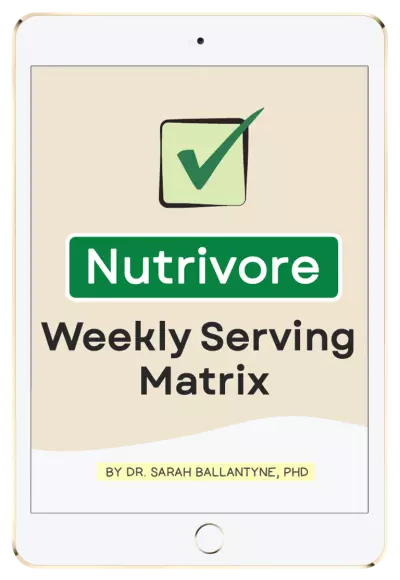
The Nutrivore Weekly Serving Matrix
The Nutrivore Weekly Serving Matrix digital resource is an easy-to-use and flexible weekly checklist designed to help you maximize nutrient-density and meet serving suggestions of Nutrivore foundational foods, all without having to weigh or measure your foods!
Includes a 22-page instructional guide and downloadable interactive guides.
Buy now for instant digital access.
Citations
Expand to see all scientific references for this article.
Clements RS Jr, Darnell B. Myo-inositol content of common foods: development of a high-myo-inositol diet. Am J Clin Nutr. 1980 Sep;33(9):1954-67. doi: 10.1093/ajcn/33.9.1954. PMID: 7416064.
Dubost NJ, Ou B, Beelman RB. Quantification of polyphenols and ergothioneine in cultivated mushrooms and correlation to total antioxidant capacity. Food Chemistry. 2007. Vol. 105(2):727-735. https://doi.org/10.1016/j.foodchem.2007.01.030. ISSN 0308-8146.
Hong MH, Jin YJ, Pyo YH. Antioxidant Properties and Ubiquinone Contents in Different Parts of Several Commercial Mushrooms. Journal of The Korean Society of Food Science and Nutrition. 2012. Vol 41(9):1235-1241. ISSN : 1226-3311
Kalaras MD, Richie JP, Calcagnotto A, Beelman RB. Mushrooms: A rich source of the antioxidants ergothioneine and glutathione. Food Chem. 2017 Oct 15;233:429-433. doi: 10.1016/j.foodchem.2017.04.109. Epub 2017 Apr 20. PMID: 28530594.
USDA Food Central Database: Mushrooms, portabella, raw
Watanabe T, Kioka M, Fukushima A, Morimoto M, Sawamura H. Biotin content table of select foods and biotin intake in Japanese. Int J Anal Bio-Sci. 2014. Vol 2(4):109-125.


